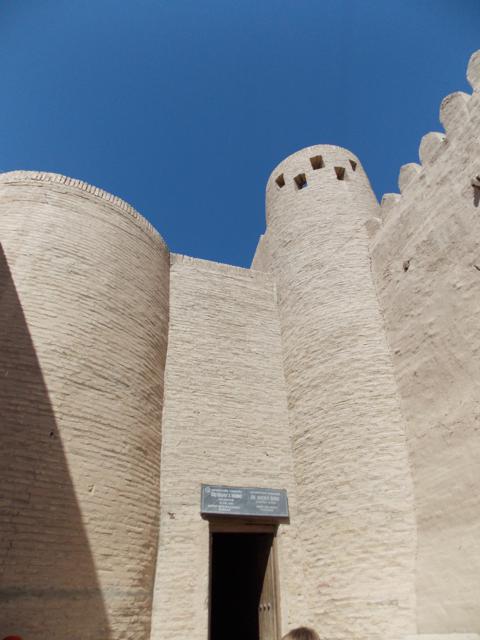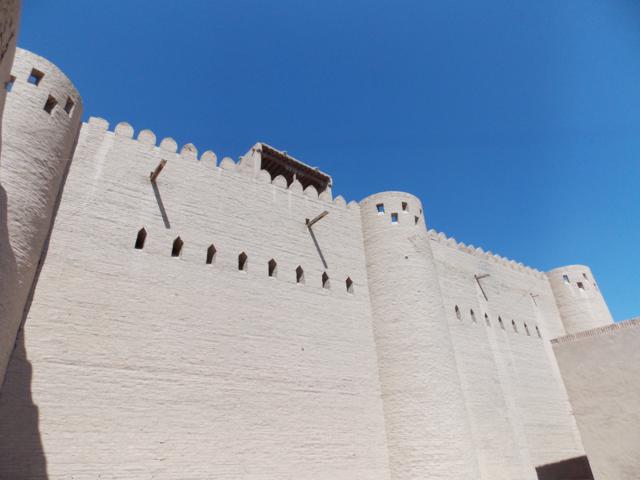Resedinta de vara a hanilor din Khiva a fost construita intre anii 1830-1838 de catre Hanul Allah Kuli. Ea este Palatul Tash-Khovli, utilizat pentru primirea oaspetilor si audiente. Numele palatului se traduce prin “casa de piatra”. Un numar de 1000 de sclavi persani au lucrat mai bine de 8 ani la construirea edificiului.
Tash-Khovli
Intr-o mica curte interioara, patrata, numita mikhmankhana, aveau loc receptiile oficiale. Musafirii petreceau in iurta (cort traditional) asezata pe un podium mai inalt (numit sufa), din caramida. Nelipsitul ayvan (terasa deschisa, sprijinita pe stalpi)impresioneaza – ca in tot palatul – prin decoratiunile de majolica albastra si tavanul frumos pictat.
ayvanul in care sedeau oaspetii
tavanul din lemn pictat
sufa (postamentul) pentru iurta
Constructia s-a realizat in etape, la decorarea palatului participand cei mai buni mesteri ai vremii. Haremul era partea in care isi avea resedinta si hanul. O curte interioara, de forma dreptunghiulara, este marginita de constructia cu un etaj, cu patru ayvane mici, cate unul pentru fiecare dintre cele patru sotii ale hanului. Ultimul, cel mai bogat decorat, apartinea hanului. Tot aici locuiau si rudele acestuia si servitorii.
Hanul Allah Kuli a condus Khiva intr-o perioada plina de succes. Comertul profitabil cu Rusia tarista a produs suficiente castiguri pentru ca ridicarea unui asemenea edificiu sa fie posibila. Decorarea palatului se datoreaza, in mare masura, lui Abdullah “Geniul”, care si-a dobandit porecla tocmai datorita artei sale. Lucratura in piatra si lemn, tavanele pictate, albastrul peretilor placati cu faianta, toate fac din Palatul Tash-Khovli un loc care iese in evidenta in Khiva.
On the Silk Road in Uzbekistan 18. Tash Khovli Palace, Khiva
The Tash-Khovli Palace, which is the Khans’ summer residence, was constructed during 1830-1838, by the mighty Allah Kuli Khan. The name means “stone house”. It is said that a thousand Persian slaves worked more than 8 years at the construction. A smaller yard, named mikhmankhana, was the ceremony court. In the middle stands sufa, where the yurt (traditional tent) was erected, and were the guests were entertained.
Another court was dedicated to the harem. Each of the four wifes of the Khan had an ayvan. The khan was also living there, and so did his relatives and servants.
Abdullah “The Genius” was the master of the rich decorations in the palace. Stone and wood, beautifully sculpted, the incredible blue of the majolica, the painted ceilings, all these make of the palace the most outstanding place in Khiva.



A FANTASTIC place for photographers…. so wonderful all these pictures….compliments.
Greetings,Joop
Thank you, Joop! Please have a nice weekend!
An incredible place, so beautiful: you really got some amazing images of it!
Thanks, VP! I’m glad you enjoy traveling here!
I love all of the details.
Thank you, Randy!
What intimidating palace walls! And the artwork and detail inside is amazing – surely a photographer’s dream!
Duncan In Kuantan
Decoratiile sunt fantastice!
I agree with Jopp!!a FANTASTIC serie of Beauty❀✽.¸¸.•*`*Hugs from Norway❀✽.¸¸.•*`*
Thank you very much, Anita! Hugs!
I hope that these buildings are not really built by slaves, but once that was often the case. Beautiful artwork way because the drawings and details are beautiful. The blue version but also the colored and colored ceiling. You make really beautiful details. Really great!
Yes, they are, Helma! Thanks for the visit!
This is a beautiful Palace.And it is a surprise to me that this was built about 200 years ago,and many Persian slaves worked here.
And I love the beautiful blue sky!
The decorative walls and the ceilings,I zoomed up every photos to see closely, they are beyond description!
Thank you for sharing these amazing pics,Traveling Hawk!
If possible,I’d like to visit there and see these architectures directly someday.
Hi, Kumiko! There are many groups of Japanese tourists there! We constantly met one of them on the airport in Tashkent, and then in Khiva. At the sights also, a lot of Japanese. I think it would not be difficult to find an organised group. It’s a place that really merits to be visited! Thanks for the comment. A wish you both a nice weekend!
what a gorgeous palace. the details are exquisitely beautiful.
The artistic work is similar to many of the Mughal palaces in India.The use of tiles reminds me of Spain too. The use of Blue tile patterns seems to be have been very popular in those days. All the pictures are beautiful, I liked specially the one with 2 cute kids.
Thanks, LifeRamblings!
Thanks for the visit, rama! Yes, you are right as concerns some similarities!
Fantatic! The palace decorations are beyond words. Beautiful presentation TH… you visit the most amazing places, I must say!
Thank you, Doug! It happens that there are places I have always wanted to see, and during the last years I took action:)
Stunning beauty and great pictures!!!
Superbe poze, chiar ai ce vedea si in Uzbekistan. Au o traditie foarte frumoasa si bogata
Thank you, Phivos!
Multumesc ca urmaresti acest serial, Marius!
Absolutely stunning place! Breathtaking surrounding.
All those old buildings which I have seen there are fantastic, Rizalenio! It was a great trip!
Știu că zvastica este un însemn întâlnit cu precădere în budism … există și în Islam?